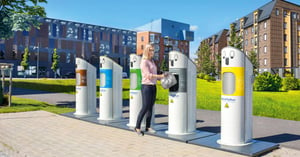For the last two months, every day at 8 pm, I go out to the balcony and together with my neighbours, we clap for all of those that are in the trenches fighting against the covid-19: nurses, doctors, people working in elderly houses and hospital staff among others. This is the minimum that we, as a society, can do right now.
Unfortunately, this is perishable, and history tells us that when a problem is over, we easily forget it. Now we have an opportunity to challenge history: people, politicians, companies, and society, all of us must change many things in an enduring way. We have to do it for us and our descendants.
Smart Waste Management is one of the solutions for cities that can help us in the fight against the pandemic to reduce the infection risk and contribute to the health of residents.
According to the Johns Hopkins University & Medicine experts in global public health, infectious disease, and emergency preparedness - who are at the forefront of the international response to COVID-19 - today we have more than 5 million of global infected and 328.554 global deaths. A global and urgent action is required today, not tomorrow.
The Organization for Economic Co-operation and Development (OECD) states: “The COVID-19 crisis may provide an opportunity for city dwellers and planners to rethink drastically, from the ground up, their consumption, production and travelling paradigm […] a new approach to urban spaces”
More than half of the global population lives in cities, and this share is expected to rise to 70% by 2050. Cities are densely populated places where people live and gather, thus at risk of spreading the virus due to the proximity among residents and challenges to implementing social distancing and touchless urban services.
The COVID-19 pandemic is continuing to spread and its impacts on human health and the economy intensifying day-by-day. The United Nations (UN) Environment Program and the World Health Organization (WHO) urged “governments to treat waste management, including of medical, household and other hazardous waste, as an urgent and essential public service to minimize possible secondary impacts upon health and the environment”.
 A pneumatic waste collection system (PWC) or automatic waste collection system (AWCS) is a smart and sustainable waste management system alternative to conventional waste collection solutions, totally avoiding manual handling & contact with waste, among many other benefits for the city, the citizens, and the environment.
A pneumatic waste collection system (PWC) or automatic waste collection system (AWCS) is a smart and sustainable waste management system alternative to conventional waste collection solutions, totally avoiding manual handling & contact with waste, among many other benefits for the city, the citizens, and the environment.
The fundamental components of any AWCS involve the depositing of waste bags into a bin or inlet door (usually called waste loading station), which are then transported with vacuum and airflow via a pipe network to a waste transfer station, where waste is introduced in totally sealed containers. The AWCS is driven by a control system and it is available 24/7/365 (view an animation video of the MetroTaifun solution for details).
The innovations in the field of “Pneumatic Waste Collection” (aka “PWC 4.0”) result in a set of futures that fits with the new requirements and recommendations from the most reputed voices in the world: United Nations, World Health Organization, UNICEF, OECD, World Bank Group and others.
The UN released a couple of weeks ago the water, sanitation, hygiene, and waste management for the COVID-19 virus interim guidance report. According to the publication, “the main routes of transmission are respiratory droplets and direct contact. Droplets may land on surfaces where the virus could remain viable; thus, the immediate environment of an infected individual can serve as a source of transmission. Recent evidence indicates that COVID-19 virus (SARS-CoV-2) survival on surfaces is ranging from 2 hours to 9 days”.
 MariMatic Oy, a Finnish company which is the most innovative company in the field of PWC, has developed the so-called PWC 4.0 and is equipping waste loading stations with totally touchless automatic opening/closing doors. No human touch with the waste disposal points is required.
MariMatic Oy, a Finnish company which is the most innovative company in the field of PWC, has developed the so-called PWC 4.0 and is equipping waste loading stations with totally touchless automatic opening/closing doors. No human touch with the waste disposal points is required.
The automatic opening/closing is also crucial for handicapped and/or elderly people - as well as for children. Doors are also incorporating a volume control device for safety reasons (something very important when dropping big commercial bags) while avoiding at the same time improper behaviour of the user.
According to the Association of Cities and Regions for Sustainable Resource Management (ACR+) the current COVID-19 pandemic raises questions and poses challenges for municipal waste management practices and procedures (safety and health measures for employees, waste treatment requirements, general procedures due to the Coronavirus for the waste sector), and of course, for citizens.
Similarly, the International Solid Waste Association (ISWA) released a list of recommendations under the title Waste Management during COVID-19, grouped into three overall priorities.
Priority 1: Ensure the continuity of services
Priority 2: Adjusting recycling services to avoid cross-contamination and infections
PWC 4.0, with different waste loading stations for different fractions (refuse, recycling, organic waste, paper …) can store temporarily inside the buffer enough volume of waste; that combined with automatic unloading, guarantees 24/365 service.
Priority 3: Ensure safe collection, disposal, and treatment of healthcare waste, making sure that they pose no risk for further infections and pollution
 Hospitals, healthcare centres, nursing & elderly homes and similar facilities are the most and worst impacted by COVID-19. All countries, states/provinces and local authorities should ensure that all healthcare waste is safely collected. By ensuring that healthcare waste will not be exposed to, nor mixed with non-infectious waste, waste workers will not be at risk during disposal activities and once healthcare waste is dumped, no human or animal will be able to come in contact with it. Then it is recommended to unload the waste as close as possible to the selected area and dump the waste immediately after unloading, taking care not to leave healthcare waste piles waiting to be dumped.
Hospitals, healthcare centres, nursing & elderly homes and similar facilities are the most and worst impacted by COVID-19. All countries, states/provinces and local authorities should ensure that all healthcare waste is safely collected. By ensuring that healthcare waste will not be exposed to, nor mixed with non-infectious waste, waste workers will not be at risk during disposal activities and once healthcare waste is dumped, no human or animal will be able to come in contact with it. Then it is recommended to unload the waste as close as possible to the selected area and dump the waste immediately after unloading, taking care not to leave healthcare waste piles waiting to be dumped.
PWC 4.0 provides several opportunities for these facilities:
- Avoid any possible exposition of waste and/or to be mixed, as waste is dumped into separate and closed inlets.
- Inlets are totally sealed, no human or animal would be in contact with waste.
- Inlets can be installed in the selected area, minimizing manual waste handling through corridors.
Unfortunately, PWC 4.0 cannot eliminate the COVID-19 pandemic, but as a smart waste management solution it can help in the fight and reduce the risk of exposure to the virus. To achieve this, we need to start today - not tomorrow. In the meantime, I will keep clapping every day for our heroes in the trenches.
Discover pneumatic waste collection systems and other smart waste management solutions in the global smart city solution network and community, and connect with thousands of members and potential partners.


